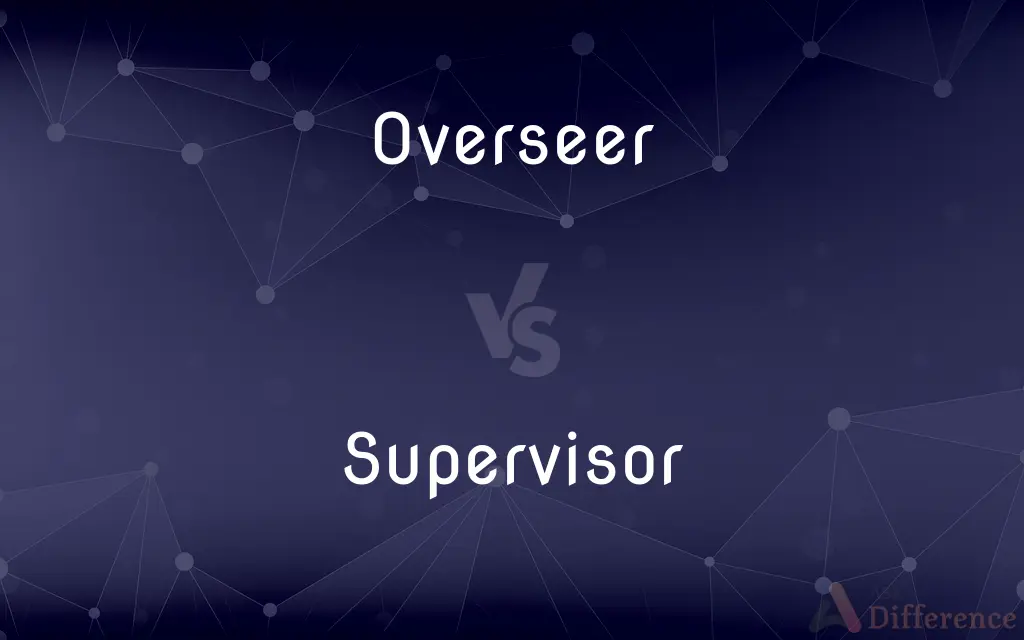Overseer vs. Supervisor — What's the Difference?
By Maham Liaqat & Fiza Rafique — Updated on March 30, 2024
An overseer manages tasks and workers in specific settings, often agricultural, while a supervisor directs staff in various environments, focusing on performance and adherence to standards.

Difference Between Overseer and Supervisor
Table of Contents
ADVERTISEMENT
Key Differences
The term "overseer" historically has roots in agricultural and construction settings, where an individual was responsible for overseeing the work of laborers, ensuring tasks were completed efficiently and effectively. On the other hand, a "supervisor" is a broader term that applies across various industries, including office environments, manufacturing plants, and service industries. Supervisors focus on guiding and evaluating staff performance, ensuring adherence to organizational standards and goals.
While overseers are typically found in settings requiring a direct oversight of manual labor, supervisors may not always be directly involved with the physical aspect of the work but are more focused on the administrative and personnel management side. Overseers might have a more singular focus on project completion and quality of work, whereas supervisors have a broader role that includes aspects of human resources, such as hiring, evaluating, and sometimes disciplining staff.
In terms of hierarchy, both overseers and supervisors play a middle-management role, acting as a link between the workforce and higher management. However, the scope of their authority and responsibilities can differ significantly based on the industry and specific organizational structure. For example, in construction, an overseer might have a very hands-on role in monitoring the progress of a project and managing workers on-site, while in an office setting, a supervisor might spend more time on scheduling, performance reviews, and ensuring team cohesion.
The concept of an overseer might carry historical connotations, especially in contexts related to plantation or slave labor, which can influence the modern interpretation and use of the term. Conversely, the term supervisor is neutral, focusing on the role of oversight and personnel management without implying any specific setting or historical context.
Finally, the effectiveness of both roles depends on the ability to communicate clearly, manage resources efficiently, and motivate a team to achieve common goals. Regardless of the specific title or industry, the success of an overseer or supervisor lies in their ability to foster a productive work environment, maintain high standards of work quality, and ensure the well-being and professional growth of their team members.
ADVERTISEMENT
Comparison Chart
Primary Setting
Agricultural, construction
Various industries, including office, manufacturing, services
Focus
Managing tasks and labor efficiency
Performance, adherence to standards, personnel management
Involvement
Hands-on, operational oversight
Administrative, personnel oversight
Responsibilities
Project completion, quality of work
Hiring, training, evaluations, team cohesion
Historical Context
Often associated with manual labor, plantations
Neutral, modern implications across industries
Authority Scope
Direct oversight of physical labor
Broader managerial responsibilities
Industry Application
More specific to certain industries
Broadly applicable across various sectors
Connotations
Can carry historical implications
Generally neutral, focused on role functionality
Compare with Definitions
Overseer
Focuses on operational efficiency and task completion.
The construction overseer monitored the building project daily.
Supervisor
Involved in administrative and personnel management.
The supervisor conducted performance reviews for all team members.
Overseer
A manager of tasks and workers, typically in manual labor settings.
The farm overseer ensured the crops were harvested on time.
Supervisor
Plays a key role in ensuring adherence to organizational standards.
As a supervisor, he implemented new protocols to improve efficiency.
Overseer
Can be found in settings like agriculture and construction.
As an overseer, her job was to manage the day-to-day operations on the site.
Supervisor
Works in diverse industries, from offices to manufacturing.
The manufacturing supervisor oversaw the assembly line workers.
Overseer
May carry historical connotations related to labor management.
The term overseer brings to mind the supervisors of past plantation systems.
Supervisor
Directs staff across various environments, focusing on performance.
The call center supervisor managed a team of customer service representatives.
Overseer
Often has a direct, hands-on management approach.
The overseer worked alongside the workers to set the pace.
Supervisor
Focuses on team cohesion and staff development.
She organized team-building activities to improve supervisor-staff relations.
Overseer
One who watches over and directs the work of others, especially laborers.
Supervisor
A supervisor, or also known as foreman, boss, overseer, facilitator, monitor, area coordinator, or sometimes gaffer, is the job title of a low level management position that is primarily based on authority over a worker or charge of a workplace. A supervisor can also be one of the most senior in the staff at the place of work, such as a Professor who oversees a PhD dissertation.
Overseer
A supervisor or superintendent.
Supervisor
A person who supervises a person or an activity.
Overseer
One who oversees or supervises.
Supervisor
One who supervises.
Overseer
(historical) The manager of a plantation of slaves.
Supervisor
One who is in charge of a particular department or unit, as in a governmental agency or school system.
Overseer
(historical) An officer responsible for the care of the poor, making out lists of voters and those who had not paid taxes, etc.
Supervisor
One who is an elected administrative officer in certain US counties and townships.
Overseer
(obsolete) A critic.
Supervisor
(management) A person with the official task of overseeing the work of a person or group, or of other operations and activities.
Overseer
One who oversees; a superintendent; a supervisor; as, an overseer of a mill; specifically, one or certain public officers; as, an overseer of the poor; an overseer of highways.
Supervisor
A person who monitors someone to make sure they comply with rules or other requirements set for them.
Overseer
A person who directs and manages an organization
Supervisor
(US) In certain states, an elected member of the governing body for a county which is called the board of supervisors.
Supervisor
(computing) A process responsible for managing other processes.
Supervisor
One who supervises; an overseer; an inspector; a superintendent; as, a supervisor of schools.
Supervisor
A spectator; a looker-on.
Supervisor
One who supervises or has charge and direction of
Supervisor
A program that controls the execution of other programs
Common Curiosities
Is the role of an overseer outdated?
While the term may carry historical or industry-specific connotations, the concept of overseeing work directly is still relevant in many sectors.
What industries commonly employ supervisors?
Supervisors are employed across a wide range of industries, including healthcare, retail, manufacturing, and services.
How are overseer and supervisor roles evolving in modern workplaces?
Both roles are evolving with a greater emphasis on leadership, team development, and adaptability to changing work environments and technologies.
What distinguishes an overseer from a supervisor?
An overseer is typically associated with direct management of manual labor tasks, while a supervisor has broader responsibilities including personnel management and performance evaluation across various settings.
What challenges do overseers face in their role?
Overseers may face challenges related to managing labor-intensive tasks, ensuring safety standards, and maintaining high productivity levels.
Can an overseer and a supervisor have similar roles?
Yes, both roles involve managing and directing work, but the context and focus of their responsibilities can vary.
Do supervisors have authority over overseers?
The hierarchical relationship depends on the organizational structure of the specific workplace; in some cases, they may be at similar levels with different areas of focus.
What skills are essential for overseers and supervisors?
Leadership, communication, problem-solving, and the ability to motivate and manage teams are crucial for both roles.
Can the terms overseer and supervisor be used interchangeably?
While they may be used interchangeably in some contexts, understanding the nuances and historical connotations of each term is important for accurate communication.
How do technology and automation impact these roles?
Both roles are increasingly integrating technology and automation for efficiency, requiring an adaptation in management techniques and skills.
Share Your Discovery

Previous Comparison
Hefemale vs. Taxonomy
Next Comparison
Saki vs. RakiAuthor Spotlight
Written by
Maham LiaqatCo-written by
Fiza RafiqueFiza Rafique is a skilled content writer at AskDifference.com, where she meticulously refines and enhances written pieces. Drawing from her vast editorial expertise, Fiza ensures clarity, accuracy, and precision in every article. Passionate about language, she continually seeks to elevate the quality of content for readers worldwide.














































